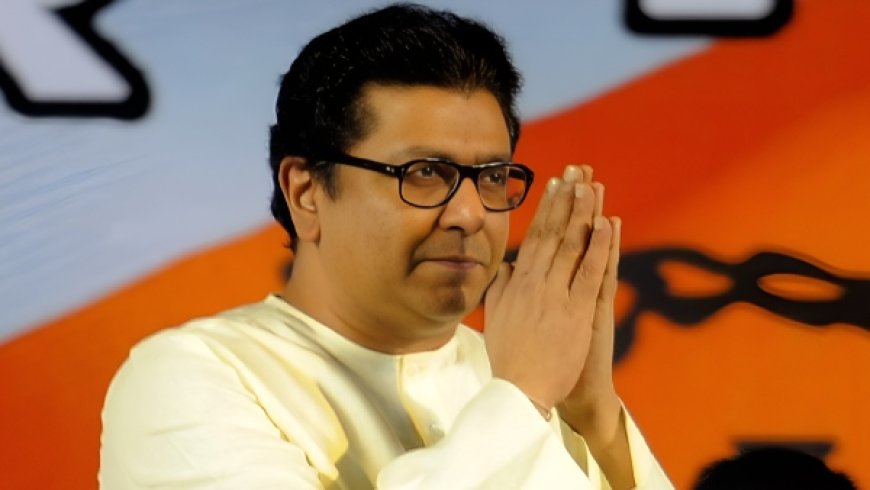Raj Thackeray’s Patel Remark Sparks Gujarat Storm: Patidars and AAP Demand Unconditional Apology
MNS chief Raj Thackeray’s remarks about the Patel community spark outrage across Gujarat. AAP and Patidar leaders demand an unconditional apology.

In a political landscape where words carry weight beyond intention, Maharashtra Navnirman Sena (MNS) chief Raj Thackeray has once again stirred a hornet’s nest — this time, with comments that have triggered a firestorm of outrage in Gujarat. His recent remarks about the Patel community, made during a rally in Mumbai, have led to swift and vocal backlash from political quarters, especially from the Aam Aadmi Party (AAP) and several influential Patidar organisations. The demand is clear: a public apology — or face intensified protests.
The Remark That Sparked Controversy
At a recent MNS gathering in Mumbai, Thackeray — known for his sharp tongue and bold statements — reportedly mocked the Patel community's migration patterns and indirectly insinuated their opportunism in business and politics. According to video footage now circulating widely on social media, he commented on “how Patels migrate to the U.S. and take over motels but shy away from contributing to the Indian economy.”
Although Raj Thackeray claimed he was merely highlighting economic trends, his remarks were seen as demeaning and stereotypical by many in Gujarat, particularly the Patidar community, which has a strong socio-political presence in the state.
AAP’s Gujarat Unit Comes Out Strongly
The Aam Aadmi Party, which has been striving to increase its influence in Gujarat, reacted strongly. Senior AAP leader and Gujarat co-incharge Isudan Gadhvi slammed the MNS chief, calling the comment “insulting to the backbone of Gujarat's growth engine.”
“Raj Thackeray owes an unconditional apology to every Patidar, every Gujarati. The community has built businesses from scratch, created jobs, contributed to the state and the nation — this remark is not just irresponsible but divisive,” said Gadhvi during a press conference in Ahmedabad.
AAP leaders also accused the Bharatiya Janata Party (BJP) of maintaining a strategic silence, suggesting that this might be a political ploy to stir regional divisions ahead of the 2026 Assembly elections in Maharashtra and Gujarat.
Patidar Community Unites in Protest
The Patidar Anamat Andolan Samiti (PAAS), led by youth activist Hardik Patel, also condemned the statement and warned of statewide protests if an apology was not issued. Various Patidar organisations based in Surat, Rajkot, and Mehsana organized silent marches and candlelight vigils to express their discontent.
In Surat, the Sardar Patel Youth Foundation announced a boycott of MNS events and issued a statement stating that “Thackeray has lost the moral right to speak about national unity when he insults one of India’s most industrious communities.”
“Our community may have roots in Gujarat, but we have spread across the world with dignity, not deceit. His words are a direct insult to every Gujarati entrepreneur, and we will not tolerate this,” said Parth Patel, president of the Foundation.
Silence from the BJP Raises Questions
Interestingly, despite the intensity of the reaction in Gujarat, the BJP leadership has maintained a cautious silence. Political analysts suggest this may be due to the alliance dynamics in Maharashtra, where the BJP might need MNS support in key constituencies.
“This silence is strategic,” said Dr. Shailesh Mehta, political commentator and professor at Gujarat Vidyapeeth. “While the BJP can't alienate the Patidars — a critical voter base in Gujarat — they also don't want to alienate Thackeray in Maharashtra. It's a tightrope.”
Socio-Political Impact on the Patidar Vote Bank
The Patidar community, which comprises roughly 12-15% of Gujarat’s population, has historically played a significant role in shaping the political climate of the state. Following the Patidar reservation agitation in 2015, the community emerged as a decisive factor in elections.
Raj Thackeray’s comments risk galvanizing a dormant voter base — one that had been relatively neutral in recent elections. AAP, which is positioning itself as a “clean and inclusive” alternative to BJP and Congress, is seizing the moment.
Political observers now believe that this controversy might reshape the electoral narrative in urban pockets like Surat, Vadodara, and Ahmedabad, where both Patidar entrepreneurs and youth dominate the demographic.
A Pattern of Provocation?
This isn’t the first time Raj Thackeray has courted controversy. From targeting North Indian migrants to attacking Bollywood personalities, his style has often been described as “firebrand nationalism laced with regional chauvinism.”
While his party’s influence has remained largely confined to parts of Maharashtra, incidents like these show Thackeray’s ability to generate national headlines — even if it comes at the cost of social harmony.
His critics argue that this may be a deliberate attempt to remain politically relevant. “It’s a distraction technique — create a controversy, get media mileage, and sideline your party’s own failures,” said AAP’s Gujarat spokesperson, Sejal Patel.
Calls for Legal Action Grow
Several public interest litigations (PILs) have reportedly been filed in Gujarat High Court and Mumbai sessions courts, demanding legal action against Raj Thackeray for defamation and inciting communal disharmony.
Senior lawyer Manish Doshi who filed one of the PILs stated, “Freedom of speech does not equate to the freedom to insult communities. We are seeking a legal precedent to ensure such leaders are held accountable.”
In light of this, human rights organizations, including the Gujarat Justice Collective, have joined the cause and written to the Election Commission of India, urging them to monitor hate speech ahead of the upcoming elections.
Conclusion: Political Ramifications Beyond Words
This controversy may fade from headlines, but its political aftershocks are likely to linger. For Raj Thackeray, this could mean further alienation outside his base. For Gujarat’s Patidar community, it is a reminder of how vulnerable cultural identity can become in political crossfire.
Whether Thackeray chooses to issue an apology or double down on his statements remains to be seen. But what’s evident is this: words matter, and in a diverse democracy like India, even one misstep can reignite historical grievances and redraw political equations.


















































